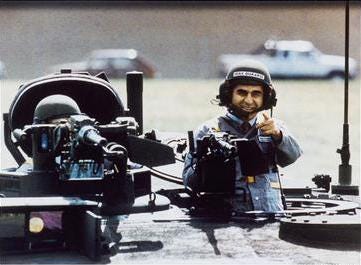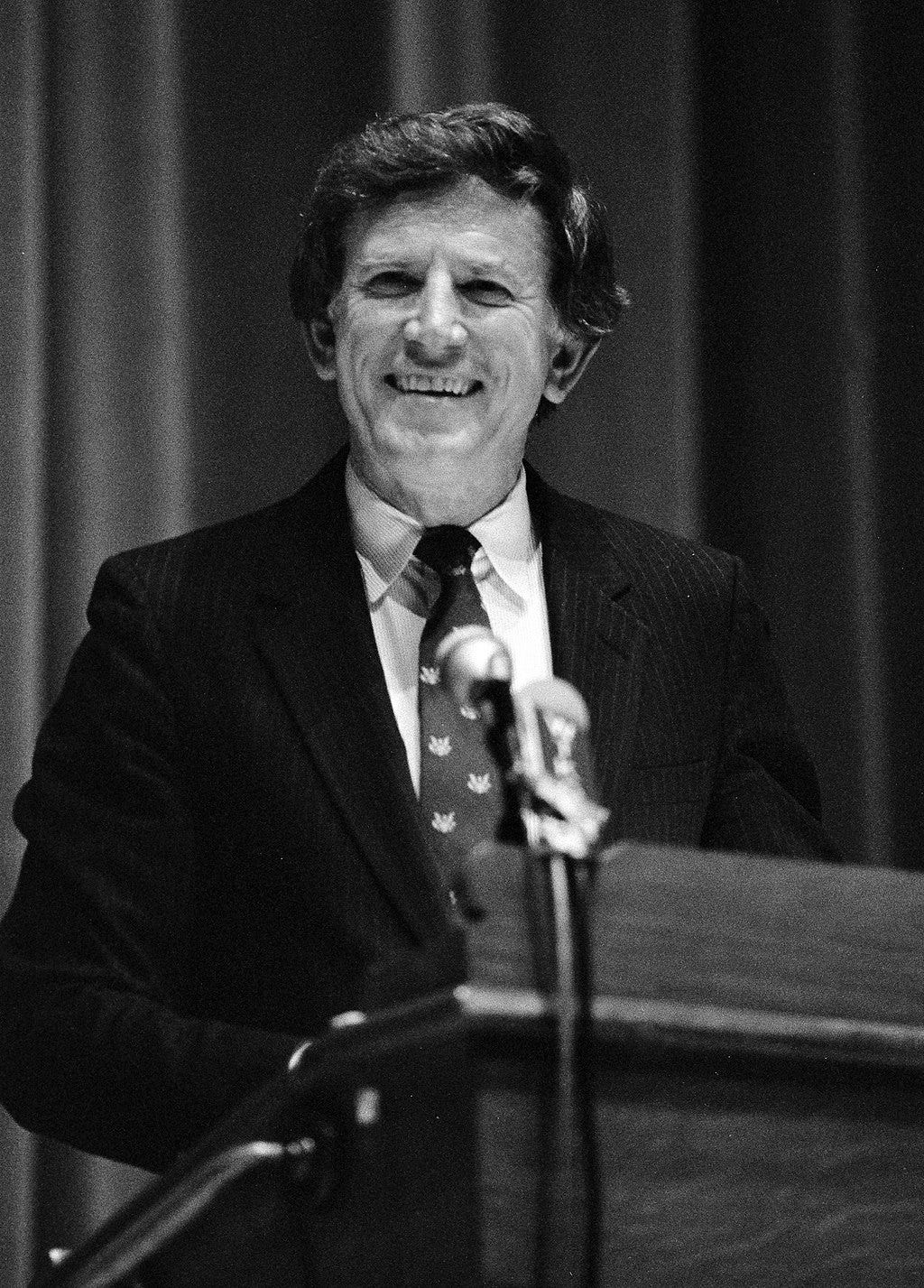Chapter Thirteen: Defining Moments
How the Rules for Qualifying to be President Have Been Rewritten in the Trump Era
Specific incidents have sometimes defined Presidential campaigns in American history.


There many others. But for pure, distilled melodrama few compare to the January 26, 1992 interview of Bill and Hillary Clinton on 60 Minutes. The Clintons met while students at the Yale Law School and married in 1975. Bill had his eye on the Presidency from his youth, and he launched his campaign on October 3, 1991. Early in the following year, he encountered a potentially devastating problem. A woman named Gennifer Flowers told a supermarket tabloid that she and Bill had been having an affair for 12 years. To all the world, this looked like Gary Hart all over again. In other words it was believed nobody could survive this and run for the Presidency.
The Clintons went on the air immediately following the Super Bowl in January of 1992. (The Washington Redskins, renamed Commanders, had just defeated the Buffalo Bills 37 to 24 in Super Bowl XXVI.) The campaign and Bill Clinton’s political future were on the line. What follows is part of that interview. Judge it for yourself.
As we all know, Bill Clinton survived this episode thanks in large part to the key contribution of Hillary. Note especially her statement at 4:34 seconds into the interview: “You know I’m not sittin’ here as some little woman standin’ by my man like Tammy Wynette. I’m sittin’ here because I love him and I respect him and I honor what he has been through and what we’ve been through together.” Bill Clinton was saved, but the reverberations of Hillary’s remark never fully died away from her public life. This was a “make or break” moment for both of them. It was a “make” for Bill; but as we shall see it was a “break” for Hillary.
Tammy Wynette (1942 – 1998), known to some as the “First Lady of Country Music,” was an iconic entertainer. Her signature song, “Stand By Your Man,” was released on September 20, 1968. She was watching the 60 Minutes Clinton interview along with millions of others. She was not happy about Hillary’s nasty swipe at her and her music, and she let her know it.
“With all that is in me,” she wrote in an open letter to Hillary, “I resent your caustic remark. I, with no apologies, am as angry as I can be with your statement. Mrs. Clinton, you have offended every woman and man who love that song – several million in number. I believe you have offended every true country music fan and every person who has ‘made it on their own’ with no one to take them to a White House. . . . . I would like you to appear with me on any forum, including networks, cable or talk shows and stand toe to toe with me. I can assure you, in spite of your education, you will find me to be just as bright as yourself.”1
Hillary apologized. She had saved her husband’s failing campaign. And the two of them changed the nature of Presidential politics. Just four years earlier, Gary Hart’s Presidential campaign collapsed because of his womanizing. A Washington Post reporter asked him, “Have you ever committed adultery?” He refused to answer.2 Bill Clinton refused to answer the same question. Hart sank into obscurity. Clinton spent the next eight years in the White House. From 1992 on, a man could cheat on his wife and not be disqualified for the Presidency.
Bill Clinton made an interesting but little noted comment in this historic interview. At 3:37, he said, “You know I can remember a time – and it was sad – when a divorced person couldn’t run for President.”
Indeed in days gone by, divorce had been an issue. Adlai Stevenson, the Democratic candidate for the Presidency in 1952 and 1956, had to deal with what has been called the “troubling issue” of his divorce.3 According to one account, Nelson Rockefeller’s divorce in 1962 was not as big a problem for him as his remarriage almost immediately after the divorce.4
Those days are now over. Gary Hart must be very resentful.
Bill Clinton survived. Hillary was politically wounded. On that January evening in 1992, all the advisors and spin masters were thinking of Bill’s political future. No one was thinking of her. According to one journalist, “Even as she was putting up an effective united front, she was presenting to an estimated 50 million viewers a tangle of contradictions. She wanted to show her independence – a quality that ended up alienating a whole set of traditional voters – but she was standing by her man – a decision that still today [this was written in 2016] alienates younger people who see it as a kind of surrender.”5
That interview imprinted Hillary on the minds of millions. She went on to lose the 2008 Democratic Presidential nomination to Barack Obama and – climactically – the 2016 election to Donald Trump. She proved the accuracy of the saying that you have only one opportunity to make a first impression.
All of which at last brings us to the man who beat Hillary in 2016, Donald Trump. Think of the road we have travelled as a nation. Divorce was once a problem. Infidelity was once a problem. A scream was once a problem. A tank was once a problem. With Trump, it would appear that we have entered the world in which nothing is a problem. Apparently no conduct however inappropriate, reprehensible, or simply incomprehensible disqualifies a Presidential candidate.
In an outstanding summation of Trump’s “lifetime of scandals,” New York Times reporter Peter Baker observes that Trump “has boasted of grabbing women by their private parts, been reported to have cheated on all three of his wives and been accused of sexual misconduct by more than two dozen women, including one whose account was validated by a jury that found him liable for sexual abuse after a civil trial.”6 Two impeachments, conviction as a felon, and the promise to violate the constitution at will if he should return to the White House. The attempt to violently overthrow the government on January 6th, 2021. All of this is okay with half the country.
On January 30, 2016, Trump famously said, “I could stand in the middle of Fifth Avenue and shoot somebody, and I wouldn’t lose voters. OK? It’s, like, incredible.”7 Trump has been proven correct in this assertion. What is the secret of his vice-like grip on his acolytes?
Here is a guess.
Trump gives all of us permission to be our lesser selves. All the laws he has broken and all the norms he has violated give us the freedom to break the rules in our own lives. This is why no revelation can shake the loyalty of his supporters. Each new scandal appears to be viewed as freeing each of us from the rules which heretofore defined – or perhaps constrained – us.
Because of Donald Trump, none of us need ever feel guilty about anything ever again.
Aaron Ryan, “Tammy Wynette’s Scathing 1992 Letter To Hillary Clinton: ‘You Have Offended Every True Country Music Fan,’” https://www.whiskeyriff.com/2022/06/19/tammy-wynettes-scathing-1992-letter-to-hillary-clinton-you-have-offended-every-true-country-music-fan/
Emily Heil, “Gary Hart still won’t answer questions of infidelity: ‘It’s nobody’s business,’” Washington Post, November 25, 2018; “Asking Gary Hart the Question He Asked For,” Washington Post, May 22, 1987.
David Halberstam, The Fifties (New York: Open Road, e-book) p. 279.
Theodore H. White, The Making of the President: 1964 (New York: HarperCollins e-book) pp. 78 – 85.
Michael Kruse, “The TV Interview That Haunts Hillary Clinton,” Politico, September 23, 2016.
Peter Baker, “For Trump, a Lifetime of Scandals Heads Toward a Moment of Judgment,” New York Times, October 20, 2024.
Colin Dwyer, “Donald Trump: 'I Could ... Shoot Somebody, And I Wouldn't Lose Any Voters,’” NPR online, January 23, 2016.





Dear Richard,
I have been utterly negligent by failing to write and say to you how much I've enjoyed this series (if "enjoy" is the right word) and how meaningful it has been to me in the period before the election. Thank you so much for undertaking the work and sharing it so generously with the world.
I've been reading your chapters from our home on the UK's North Norfolk coast. Every day as the campaign updates have come in I've had some part of your manuscript in mind. All along I have been thinking to myself, "It's wonderful that Richard is writing this, and after Kamala is elected it will instantly be a period piece that future students of American history may look back on with wonder and dismay." Today of course, many of us look on with another sort of wretched wonder and dismay, at a minimum, as we prepare to be saddled with and grimly endure four more years of the dystopian future you've previewed over the summer and early fall.
I found your closing paragraphs of the Oct 29 chapter to be particularly clarifying. You said, "Trump gives all of us permission to be our lesser selves. All the laws he has broken and all the norms he has violated give us the freedom to break the rules in our own lives. This is why no revelation can shake the loyalty of his supporters. Each new scandal appears to be viewed as freeing each of us from the rules which heretofore defined – or perhaps constrained – us." That struck me as such a precise, accurate and lacerating explanation for the Trump phenomenon. God knows how this perceived liberation, especially after Tuesday, will manifest itself now. I'm so, so worried -- and living across the Atlantic from it doesn't seem like a safe distance at all.
I hope this finds you well. You are clearly still one of the shining lights of American history and I hope you keep it up.
Best personal regards
John